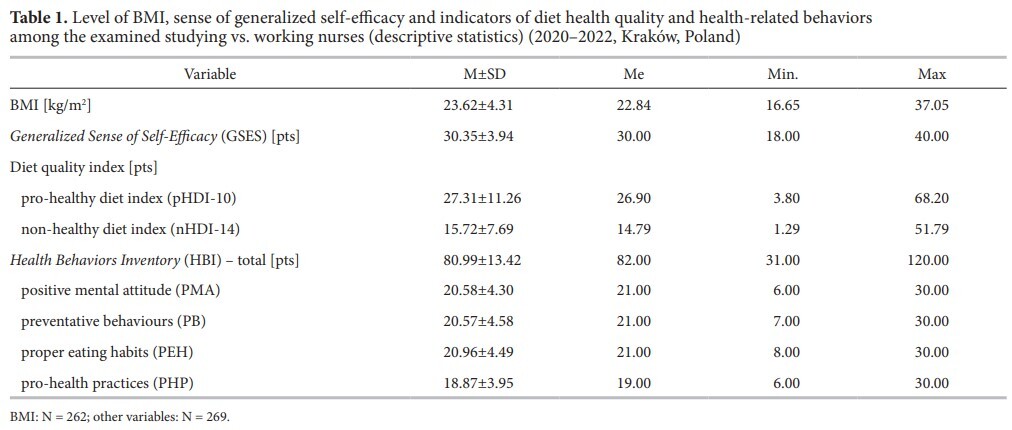Online first
Bieżący numer
Archiwum
Najczęściej cytowane 2024
O czasopiśmie
Zespół Redakcyjny
Komitet Redakcyjny
Polityka prawno-archiwizacyjna
Kup czasopismo
Klauzula informacyjna o przetwarzaniu danych osobowych
Deklaracja dostępności
Instrukcje dla Autorów
Instrukcje dla Recenzentów
Polecamy
Kontakt
Recenzenci
2024
2023
2022
2021
2020
2019
2018
2017
2016
2015
2014
2013
Redakcja i tłumaczenia
PRACA ORYGINALNA
Sense of generalised self-efficacy and body mass index, diet health quality and pro-health behaviours of nursing students and active professional nurses
1
University of Physical Education in Kraków, Kraków, Poland (Department of Sports Medicine and Human Nutrition, Institute of Biomedical Sciences)
2
University of Physical Education in Kraków, Kraków, Poland (Department of Theory and Methodology of Physical Education, Institute of Social Sciences)
3
University of Physical Education in Kraków, Kraków, Poland (Department of Psychology, Institute of Social Sciences)
Data publikacji online: 21-08-2023
Autor do korespondencji
Maria Gacek
University of Physical Education in Kraków, Department of Sports Medicine and Human Nutrition, Institute of Biomedical Sciences, Jana Pawła II 78, 31-571 Kraków, Poland
University of Physical Education in Kraków, Department of Sports Medicine and Human Nutrition, Institute of Biomedical Sciences, Jana Pawła II 78, 31-571 Kraków, Poland
Med Pr Work Health Saf. 2023;74(4):251-61
SŁOWA KLUCZOWE
DZIEDZINY
STRESZCZENIE
Background: Personal resources are one of the determinants of lifestyle and health. The aim of the research was to analyze the relationship between sense of generalized self-efficacy, and body mass index (BMI), diet health quality and health behaviors of female nursing students and active professional nurses. The analyzed variables in the group of students and nurses were also compared. Material and Methods: The study was conducted among a group of 269 women (174 students and 95 nurses working at hospitals), using: the Beliefs and Eating Habits Questionnaire (KomPAN), Juczyński’s Health Behavior Inventory (HBI) and the Generalized Self-Efficacy Scale (GSES). The BMI was assessed on the basis of anthropometric measurements. Statistical calculations were performed using analysis of variance, the Student’s t-test, multivariable regression analysis and Pearson’s correlation as well as moderation analysis, with the adopted level of statistical significance at α = 0.05. Results: Professionally active nurses achieved higher BMI levels (25.95 vs. 22.31 kg/m2, p < 0.001) and a higher non-healthy diet index – nHDI-14 (17.04 vs. 15.00, p = 0.038) than students. It was shown that with the increase in generalized self-efficacy (GSE), diet health quality and the level of positive mental attitude, proper eating habits and the overall index of health behaviors increased. The BMI increased with the rise in the non-healthy diet index and with the decline in health behaviors (individual categories and the overall index). It was not found that the group (students vs. working nurses) was a moderator of the relationships between health behaviors and indicators of diet health quality with GSE of the studied nurses (p > 0.05). Conclusions: Nurses with a higher sense of self-efficacy declared a higher diet health quality and healthier behaviors, and their BMI was related to diet quality and health behaviors. Med Pr Work Health Saf. 2023;74(4):251–61.
Udostępnij
ARTYKUŁ POWIĄZANY
Przetwarzamy dane osobowe zbierane podczas odwiedzania serwisu. Realizacja funkcji pozyskiwania informacji o użytkownikach i ich zachowaniu odbywa się poprzez dobrowolnie wprowadzone w formularzach informacje oraz zapisywanie w urządzeniach końcowych plików cookies (tzw. ciasteczka). Dane, w tym pliki cookies, wykorzystywane są w celu realizacji usług, zapewnienia wygodnego korzystania ze strony oraz w celu monitorowania ruchu zgodnie z Polityką prywatności. Dane są także zbierane i przetwarzane przez narzędzie Google Analytics (więcej).
Możesz zmienić ustawienia cookies w swojej przeglądarce. Ograniczenie stosowania plików cookies w konfiguracji przeglądarki może wpłynąć na niektóre funkcjonalności dostępne na stronie.
Możesz zmienić ustawienia cookies w swojej przeglądarce. Ograniczenie stosowania plików cookies w konfiguracji przeglądarki może wpłynąć na niektóre funkcjonalności dostępne na stronie.






